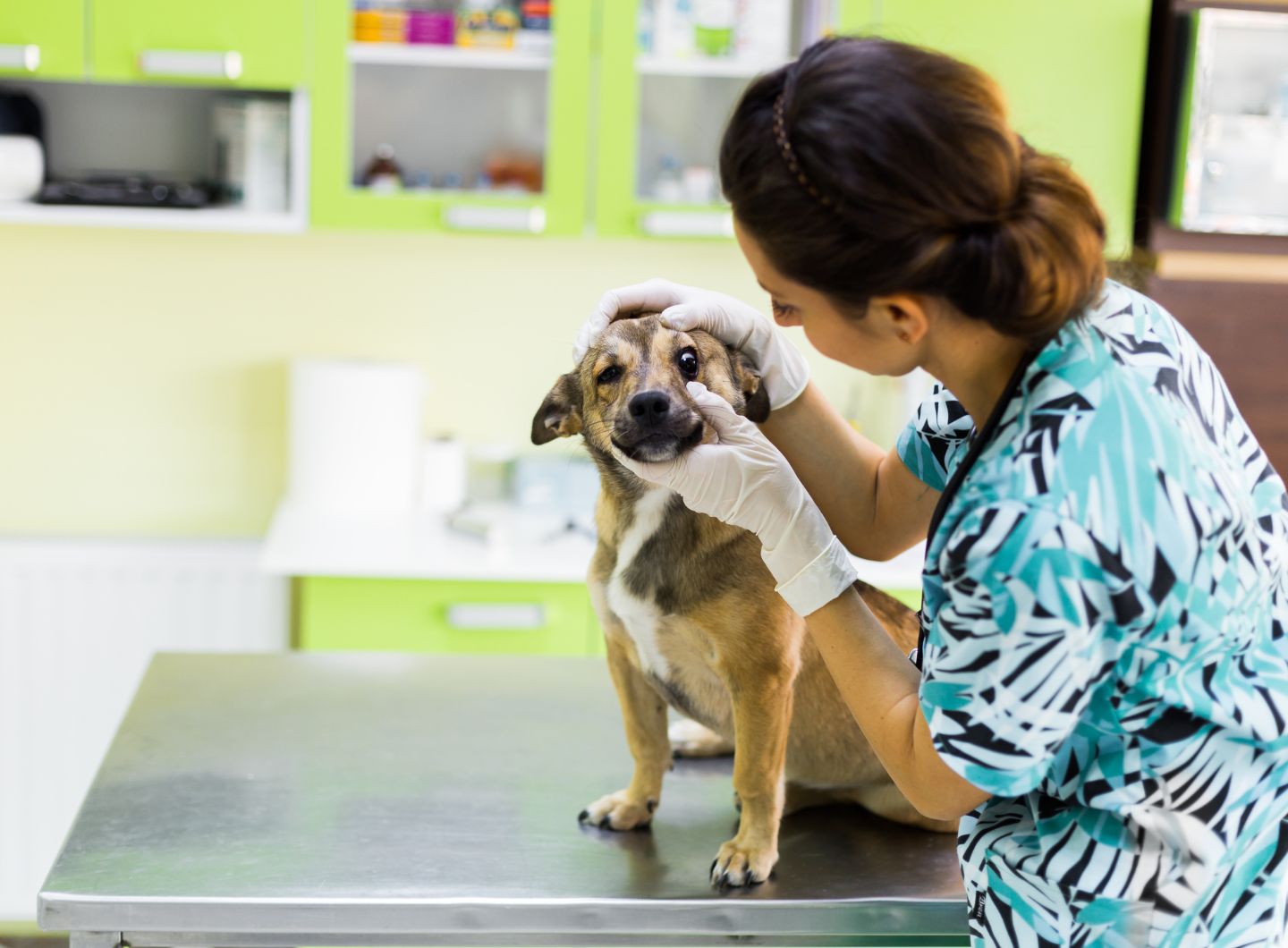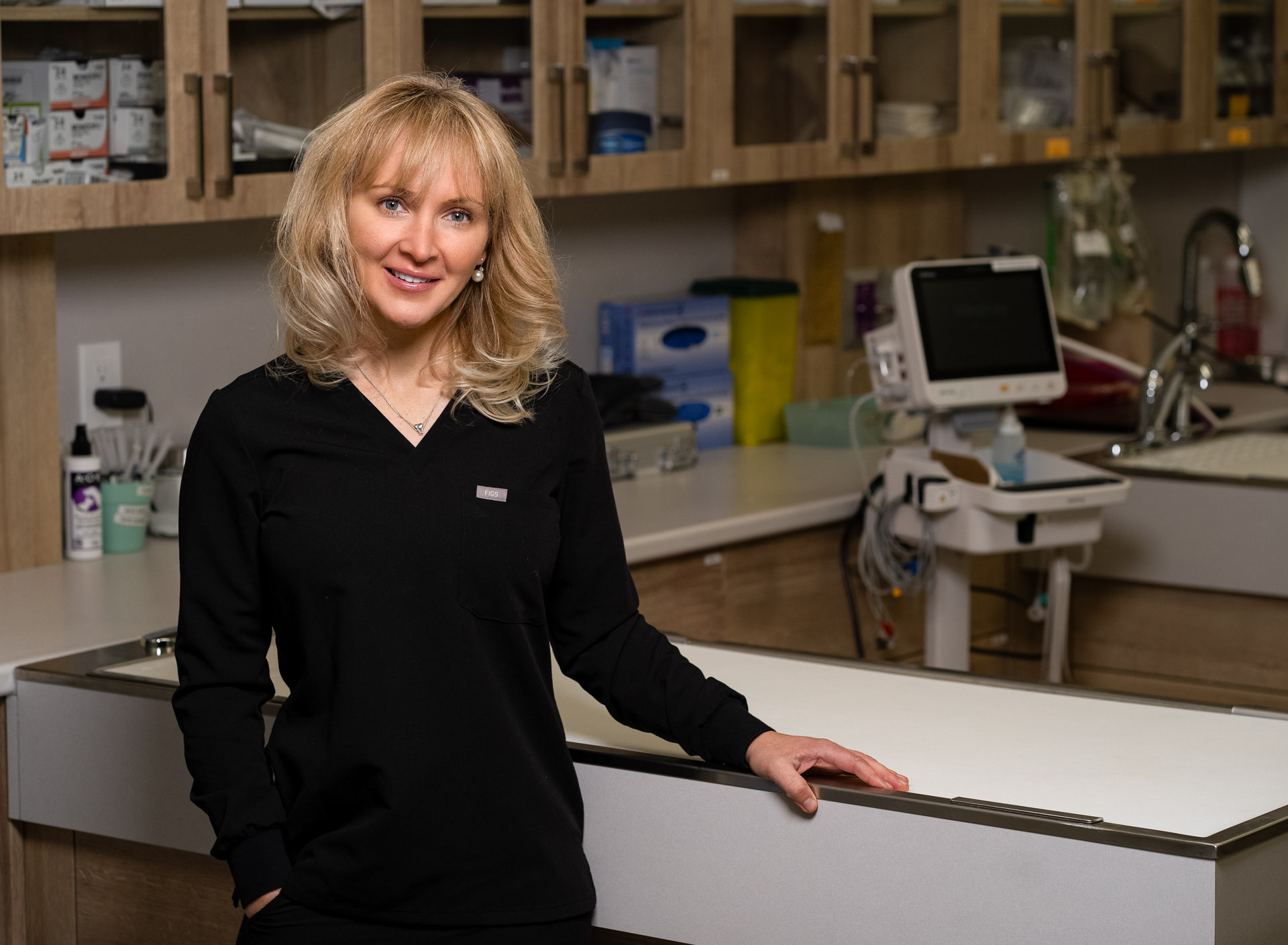Who is a Veterinary Ophthalmologist?
A veterinary ophthalmologist is a board certified specialist in the diagnosis and management of diseases of the eye and periocular structures. An ophthalmologist undergoes extensive training to acquire the specialized skills to diagnose and treat ocular diseases, both medically and surgically. This involves completing veterinary school to become a veterinarian (4 years), an internship program (minimum of 1 year), and an approved 3-year comparative ophthalmology residency training program. After this training, the veterinarian must then complete and pass multi-day written and practical examinations to become a board-certified veterinary ophthalmologist. Our ophthalmologist, Dr. Veronica Feigel, is board-certified with the American College of Veterinary Ophthalmologists (ACVO).

Our Ophthalmology Specialist

Dr. Veronica Feigel
Veterinary Ophthalmologist
Learn More »
When Should Your Pet See Our Ophthalmologist?
Our ophthalmology team is willing to see your pet anytime they have an ocular concern. We accept referrals from primary care veterinarians as well as self-referrals directly from owners. Time is of the essence in many ocular diseases, so we encourage early referrals. For this reason, we offer same-day urgent appointments and after-hours emergency appointments (see below). Some of the more common changes that warrant concern are:
- Squinting (keeping the eyelid closed)
- Pawing at the eye(s)
- Swelling of any ocular tissues
- Redness of any ocular tissues
- Increased tearing ± colour change of the tears
- Cloudiness of the eye(s)
- Dents or divots to the surface of the eye
- Ocular colour changes
- Changes in the size of the eye(s)
- Lumps or bumps around or in the eye(s)
- Changes in vision
- Sudden blindness
What Are Some of the Common Conditions Our Ophthalmologist Treats?
- Eyelid diseases (e.g., entropion, ectropion, masses/swellings, irritation, ectopic cilia, distichiasis)
- Dry eye
- Cherry eye
- Corneal diseases
- Corneal ulcers
- Uveitis
- Intraocular tumours
- Cataracts and cataract surgery
- Glaucoma
- Retrobulbar diseases
- Retinal diseases
- Optic neuritis
What Are Some of the Tests Our Ophthalmologist Uses for the Diagnosis and Monitoring of Ocular Problems?
- Schirmer Tear Test evaluates tear production and is used to look for underlying dry eye.
- Tonometry to evaluate intraocular pressures to diagnose or rule out glaucoma.
- Fluorescein dye stain to evaluate corneal health, and nasolacrimal duct patency (tear drainage). This is most commonly used for the evaluation of corneal ulcers.
- Electroretinogram (ERG). This test is like an electrocardiogram (ECG) for your heart but assesses retinal function instead. This test is used if sudden blindness is present.
- Gonioscopy is used in cases of glaucoma to help differentiate between primary and secondary glaucoma.
- CT scans are used if a disease around or behind the eye is suspected.
- Ocular ultrasound to assess for diseases that are not visible by examination alone.
What Are Some of the Common Surgical Procedures Our Ophthalmologist Performs?
- Cataract surgery (phacoemulsification and artificial lens placement)
- Lens removal (for treatment of lens luxation)
- Corneal surgery, including conjunctival grafts, amnion grafts, laceration repair, sequestrum removal, and dermoid removal
- Eyelid surgery, including correction of entropion/ectropion, lid length, mass/tumor resection, hair removal (ectopic cilia, distichiasis), laceration repair, reconstruction, and agenesis
- Cherry eye replacement
- Third eyelid laceration repair and tumor resection
- Enucleation (eye removal)
- Select surgery for treatment of dry eye
What Types of Medications are Often Required?
- Eye drops
- Eye ointments
- Oral medications, including pills and liquids
What Should You Expect When Booking an Appointment with Our Ophthalmologist at Capital City Specialty & Emergency Animal Hospital?
If your primary care veterinarian is referring your pet, we will reach out to you as soon as possible to schedule your appointment. If you are doing a self-referral for your pet, please either call (613-244-7387) or email (at eyes@capcityvet.com) our team directly. One of our team members will schedule you into the next available appointment slot. If the condition is urgent, we do offer same day emergency appointments as well as after-hours emergency appointments.
We will discuss these options with you if they are warranted. Our regular schedule is Monday to Thursday from 8 a.m. until 5 p.m. Dr. Feigel is available for after-hours services as needed. Please call the hospital immediately if you require an urgent appointment.
On the day of your appointment, you and your pet will be checked in at reception and brought to the ophthalmology examination room. Dr. Feigel will use specialized equipment to thoroughly examine the structures of your pet’s eyes and surrounding structures. This involves a three-part examination including a Schirmer Tear Test to evaluate tear production, tonometry to evaluate intraocular pressures, and fluorescein dye stain to evaluate corneal health. Please note, these tests are not always performed if they are not required or if it is not safe to do so.
After this examination, Dr. Feigel will thoroughly discuss the examination findings with you and will make a treatment plan that best suits your pet, their condition, and your involvement. The entire process will take approximately 40-60 minutes.
If medications are required, a treatment plan and medications will be sent home with you with detailed instructions.
If surgery is also required or recommended, this will be reviewed with you thoroughly. Anesthesia will be provided and monitored by our board-certified anesthesiologist, Dr. Matt Milloway, and his team for each surgical case for the best and safest care possible.
A thorough report will be sent to both you and your primary care veterinarian, including Dr. Feigel’s examination findings, diagnosis, treatments, follow-up recommendations, and a review of the conditions/diseases. This will ensure that we are all included as a team to provide continuity of care for your pet.
We strive to provide you and your pet with the highest level of care. We love what we do, we love our patients, and we treat them as if they were our own.
If you would like to see an appointment with Dr. Feigel and her team from an owner’s perspective, then please watch the following video:


